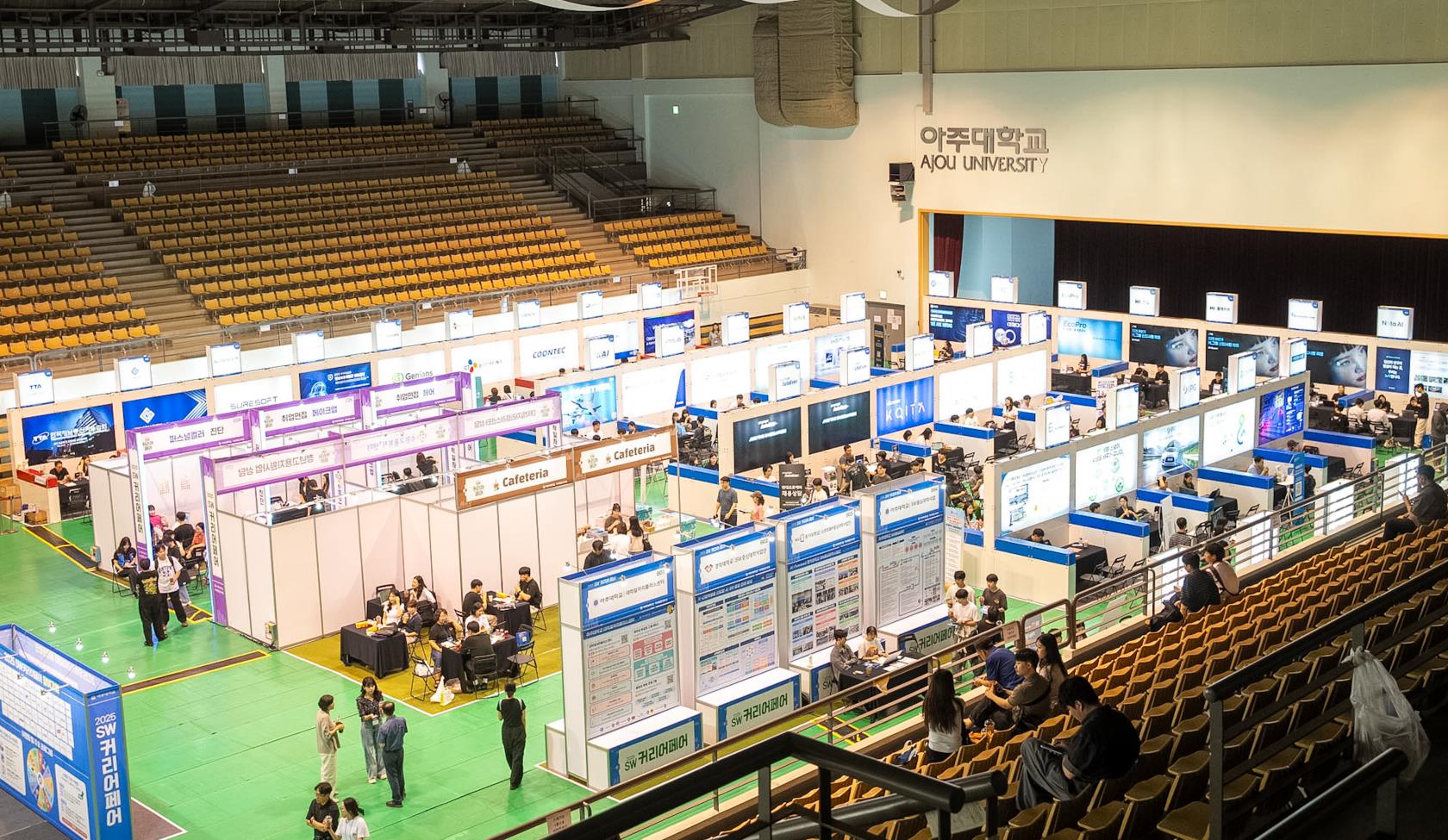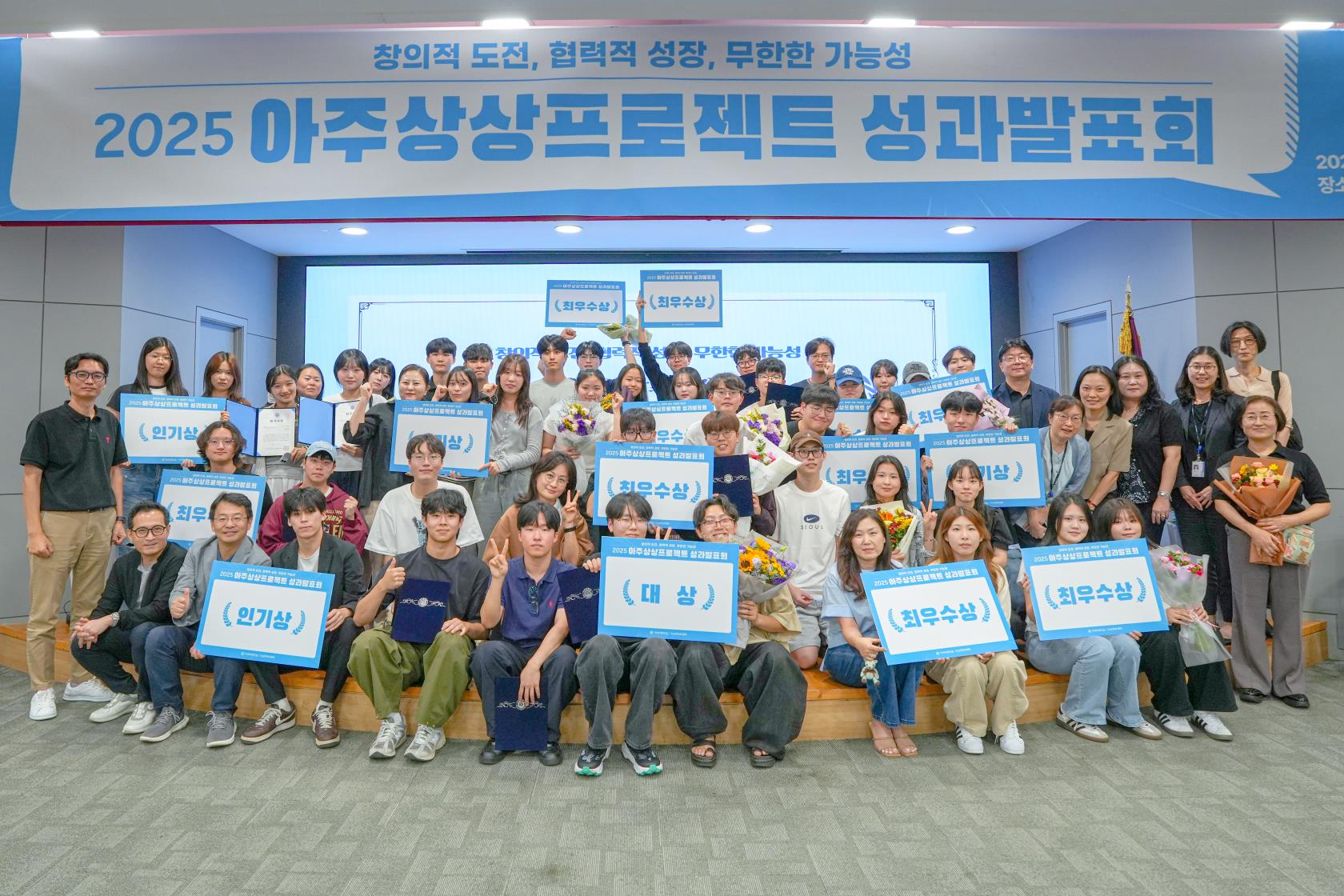미중정책연구소 커뮤니티
아주대학교 미중정책연구소의 새로운 소식입니다.- 공지사항
더보기
-
2024.0818
[세미나 2024.08.26] 한중 관계의 도전과 기회: 한중 외교 및 경제 관계 전망
아주대학교 미중정책연구소는 아래와 같이 세미나를 개최 예정입니다. 많은 참석을 부탁드립니다! * 주제: "한중 관계의 도전과 기회: 한중 외교 및 경제 관계 전망" * 일시: 2024년 8월 26일(월) 14:00-17:00 * 장소: 국회박물관 2층 국회체험관 * 공동주최: (사)플라자프로젝트, 한중의원연맹, 아주대학교 미중정책연구소 *세미나 당일 주차는 "국회의사당 국회둔치주차장"을 이용해주시기 바랍니다. 감사합니다!
-
2024.0710
[학술회의 2024.07.02] 아주대 미중정책연구소 제11회 한-중 정책학술회의
-
2024.0503
미중정책연구소 - 연구보조원(인턴) 선발 공고
연구보조원 (인턴) 선발 공고 아주대학교 미중정책연구소에서는 연구보조원(인턴)을 아래와 같은 일정으로 선발하오니, 아주대학교 재학생들의 많은 지원 바랍니다. [업무 및 혜택] 업무 : 행사지원, 자료정리 혜택 : 시급 (아주대 교내 학칙 준거), 식사 제공, 인턴 확인증 발급 [공고 세부사항] 1. 선발인원 : 총 10명 2. 소속 : 아주대학교 학부 1학년~4학년 재학생 또는 졸업생 3. 전공 : 전공 불문, 모든 학과 전공생은 지원 가능함 [지원서 접수] 1. 지원서 다운로드 : 아주대학교 미중정책연구소 홈페이지 https://ucpi.ajou.ac.kr/ucpi 2. 지원서 제출 기한: 2024년 5월 10일 금요일 18:00 (오후 6시) 3. 지원서 제출 방법 : 이메일 제출 (PDF 또는 워드 파일) 4. 지원서 제출처 : 서대옥 실장 doseo@ajou.ac.kr [면접] 면접 일정 : 2024년 5월 14일 화요일 세부 일정은 추후 “개별통지”예정
-
2024.0818
- 언론보도
더보기
-
2025.0901
[한국일보 2025.08.29] '김정은 방중' 사전 보고받은 이 대통령, 전승절 불참 선택한 이유는
이재명 대통령이 내달 3일 중국 베이징 톈안먼 광장에서 열리는 항일전쟁 및 세계 반파시스트 전쟁 승전(전승절) 80주년 열병식에 김정은 북한 국무위원장의 참석 가능성이 높다는 보고를 이달 초 받았던 것으로 확인됐다. 취임 후 대북 유화책을 펴고 있는 이 대통령이 김 위원장의 참석 가능성이 큰 전승절 기념식 불참을 결정한 데에는 한미 정상회담에 대한 부담이 작용했다. 28일 복수의 정보·외교 소식통에 따르면, 대통령실은 이달 초 정보·외교당국으로부터 '김 위원장이 전승절 참석을 추진할 수 있다'는 분석을 보고받았다. 해당 보고에는 "중국이 올해 북중 협력의 질적 도약을 위한 전환점을 만들겠다는 방침을 세우며 전면적 관계 개선을 위한 움직임을 보이고 있다"며 "전승절을 계기로 고위(정상)급 교류 가능성을 배제할 수 없다"는 취지의 내용이 담긴 것으로 알려졌다. 중국 주도로 남북 정상이 마주치는 장면이 연출될 가능성에 대한 내용도 보고에 포함됐지만 이 대통령은 불참을 택했다. 정부 소식통은 "김 위원장이 전승절에 최초로 참석하더라도 한미 정상회담과 관련해 불안 변수가 컸다"며 "우방국들이 대다수 불참하는 상황에서 자칫 북한·중국·러시아 정상이 모인 자리에 한국 대통령이 함께하는 그림이 나올 수 있다는 점이 부담으로 작용했다"고 전했다. ①러시아-우크라이나 전쟁이 지속되고 있고 ②한미 정상회담의 일정 및 의제 조율이 난항을 거듭하는 가운데 ③동맹 및 우방국들이 주시하는 전승절 행사에 '남북 정상 간 만남'을 위해 참석하기엔 외교적 부담이 적잖았다는 설명이다. 강준영 한국외대 교수는 "박근혜 대통령이 2015년 전승절 70주년 행사에 온갖 우려를 무릅쓰고 다녀온 결과를 보지 않았나"라며 "김 위원장의 참석 가능성이 있다 해도 이 대통령이 참석하기엔 부담이 컸다"고 분석했다. 강훈식 대통령 비서실장은 이날 김 위원장의 방중 계획을 사전 인지한 사실을 언급하며 "한미 정상회담도 이런 일들의 영향을 기본으로 받았다"며 "(한미 회담에서 논의가) 잘된 부분들에 대해선 이런 흐름의 연장선에서 해석해 볼 여지가 있다"고 했다. 국제 사회에서 '불법 핵무장국'인 북한 지도자가 26개국 대표가 모이는 중국 전승절 행사에 참석하는 것은 중국이 조성한 '반미 연대' 속에 북한의 외교력이 확인받는 자리가 될 수도 있다. 그런 자리에 이 대통령이 참석을 결정했다면 중국 전승절 이전 열린 한미 정상회담에 악재로 작용할 수밖에 없다. 트럼프 대통령 주변 극우 인사들이 이 대통령에 대한 '친중' 이미지를 더욱 부각시키는 결과를 초래할 수 있기 때문이다. 그럼에도 이 대통령이 전승절에 참석해야 한다는 의견도 있다. 김흥규 아주대 미중연구센터소장은 "중국의 기본 목표는 한반도가 국가전략에 방해 요소가 되지 않도록 안정적으로 관리하려는 것인 만큼 남북 간에 역할을 할 수 있다"며 "전승절에 참석해 '한미일 대 북중러' 구도를 깨는 것이 실용외교"라고 말했다.
-
2025.0901
[경향신문 2025.08.27] “피스메이커 발언 분위기 바꿔” “한·중관계 설정 쉽지 않을 것”
이 대통령·트럼프 신뢰 구축 “도그마에 안 빠진 실용외교” 미와 공동합의문 없는 것엔 “공식문서화 안 된 게 다행” 미 관세 등 실무 협상 남아 이재명 대통령이 5박6일간의 일본·미국 순방 일정을 마쳤다. 경향신문은 27일 국내 외교 전문가들에게 이 대통령의 한·미 정상회담과 한·일 정상회담에 대한 평가와 향후 과제를 들어봤다. 전문가들의 총평은 대체로 긍정적이었다. 양무진 북한대학원대학교 교수는 “코리아 이즈 백(한국이 돌아왔다)이 완성 단계에 왔다”고 말했다. 하상응 서강대 정치외교학과 교수는 “두 회담 전 우려한 사항들이 현실화된 게 없었다”고 했다. 박원곤 이화여대 북한학과 교수는 “일본을 먼저 가서 ‘과거에 연연하지 않고 미래로 가겠다’고 하고, 미국에서 ‘안미경중(안보는 미국, 경제는 중국) 안 된다’고 한 것은 도그마와 이데올로기에 빠지지 않는 실용외교”라고 평가했다. 한·미 정상회담을 두고는 이 대통령이 도널드 트럼프 미국 대통령과의 첫 상견례 자리에서 인간적인 신뢰를 구축한 데 점수를 줬다. 전봉근 한국핵정책학회장은 “새로운 미국과 나빠진 외교·안보 환경에서 한국식 접근법이 성공했다”며 “이 대통령과 트럼프 대통령 간 개인적 신뢰와 협력 모드가 구축된 게 최대 성과”라고 말했다. 가장 인상적인 장면으로는 이 대통령의 피스메이커·페이스메이커 발언을 꼽은 전문가가 많았다. 양 교수는 “피스메이커·페이스메이커 발언은 신의 한 수”라며 “이 대통령이 분위기를 주도해 껄끄러운 의제가 상당히 희석됐다. 한반도 평화 문제를 (회담 의제로) 부각한 전략적 성과”라고 말했다. 하 교수도 “트럼프 대통령이 주한미군 감축 등 관련 얘기를 할 수 있었던 시간을 김정은 얘기로 완전히 다른 데로 돌렸다는 게 의미 있다”고 말했다. 민정훈 국립외교원 교수는 “북한 문제를 적극적으로 지렛대로 활용하며 북·미관계 개선 시 코리아 패싱 우려를 불식했다”고 말했다. 경제·통상 분야 논의도 긍정 평가했다. 전 회장은 “한국이 (미국의) 제조업이 부흥하는 데 필요한 파트너 국가라는 인식을 명확히 심어줬다”고 말했다. 하 교수는 “관세 문제에 대해 지나치게 디테일하게 들어가지 않았다는 것 자체가 큰 수확”이라고 평가했다. 공동합의문이 나오지 않은 것은 실패가 아니라 다행이란 의견도 나왔다. 양 교수는 “트럼프 대통령이 다른 국가들과의 정상회담 이후 문서화하지 않고 계속 협의하며 (내용을) 더 단단하게 만들어가는 게 있다”며 “(공동합의문을 만들지 않은 게) 우리에게 도움이 될 수 있다”고 말했다. 민 교수는 “힘이 강한 미국이 숫자로 밀어붙여 우리를 옥죄려고 하는데 공동합의문을 내는 건 한국의 이해에 부합하지 않았을 것”이라고 말했다. 이 대통령이 미국보다 일본을 먼저 방문한 데 대해서도 호평을 내놨다. 민 교수는 “미국 내에서도 한·일관계를 관리하려는 한국의 선제적인 모습에 굉장히 긍정적인 평가를 받았다. 그 부분이 한·미 정상회담의 마중물 역할을 했다”고 말했다. 홍현익 전 국립외교원장도 “전략적으로 일본을 거쳐 간 것이 성공한 것”이라고 했다. 다만 양 교수는 “대북 제재 이행이나 북한 사이버테러 등이 합의문에 들어갈 필요가 있었는지 의문”이라며 “북한에 대한 (불필요한) 자극”이라고 했다. 구체적인 협상이 마무리되지 않은 만큼 향후 이어갈 세부 논의는 과제로 남았다는 평가가 나온다. 박 교수는 “관세 협상과 안보 문제가 해결된 건 하나도 없기 때문에 이제부터 지난한 협상이 남았다”고 말했다. 민 교수는 “강훈식 대통령비서실장과 수지 와일스 백악관 비서실장 간 구축을 약속한 핫라인을 잘 활용해야 한다”고 말했다. 이 대통령이 한·미 동맹과 한·미·일 협력을 강조하며 중국과의 관계 설정이 쉽지 않을 것이란 지적도 나왔다. 김정섭 세종연구소 수석연구위원은 “한·미관계와 한·중관계가 동등할 수는 없지만 한·중관계를 너무 평가절하하는 것은 조심해야 한다”고 말했다. 김흥규 아주대 미중정책연구소 소장은 “이재명식 실용외교를 하려면 이 대통령이 9월4일 (중국 전승절에) 중국을 가야 한다”며 “중국과의 관계도 잘 관리해 나가는 모습이 미국에도 상당한 압박으로 갈 것”이라고 밝혔다. 전 회장은 “국내의 갈등 요인이 (이 대통령이) 외교적 역량을 활용하는 걸 상당히 제약하고 있다”며 “외교에 대해선 여야 간 대타협이 필요하다”고 말했다.
-
2025.0901
[경향신문 2025.08.27] “도그마 빠지지 않아” “피스메이커 발언은 신의 한수”···전문가들, 이 대통령 첫 순방 평가
이재명 대통령이 5박 6일간의 일본·미국 순방 일정을 마치고 28일 새벽 귀국한다. 경향신문은 27일 국내 외교 전문가들에게 이 대통령의 한·미정상회담과 한·일정상회담에 대한 평가와 향후 과제를 들어봤다. 전문가들의 총평은 대체로 긍정적이었다. 양무진 북한대학원대학교 교수는 “코리아 이즈 백(한국이 돌아왔다)이 완성 단계에 왔다”고 말했다. 하상응 서강대 정치외교학과 교수는 “두 회담 전 우려한 사항들이 현실화된 게 전혀 없었다”고 했고, 홍현익 전 국립외교원장은 “주어진 여건에서 최선의 결과를 냈다”고 했다. 박원곤 이화여대 북한학과 교수는 “일본을 먼저 가서 ‘과거에 연연하지 않고 미래로 가겠다’고 하고, 미국에서 ‘안미경중(안보는 미국, 경제는 중국 중시) 안된다’고 한 것은 도그마와 이데올로기에 빠지지 않는 실용외교”라고 평가했다. 한·미정상회담을 두고는 이 대통령이 도널드 트럼프 미국 대통령과의 첫 상견례 자리에서 인간적인 신뢰를 구축한 데 점수를 줬다. 전봉근 한국핵정책학회장은 “새로운 미국과 나빠진 외교·안보 환경에서 한국식 접근법에 성공했다”며 “가장 우려했던 부분인데, 이 대통령과 트럼프 대통령 간 개인적인 관계가 원활히 구축됐다. 개인적인 신뢰와 협력 모드가 구축된 게 최대 성과”라고 말했다. 가장 인상적인 장면으로는 이 대통령의 피스메이커·페이스메이커 발언을 꼽은 전문가들이 많았다. 양무진 교수는 “피스메이커·페이스메이커 발언은 신의 한수”라며 “이 대통령이 소위 분위기 메이커, 즉 회담의 분위기를 주도해 껄끄러운 의제가 상당히 희석됐다. 한반도 평화 문제를 (회담 의제로) 부각한 전략적 성과”라고 말했다. 하상응 교수도 “트럼프 대통령이 남는 시간에 주한미군 감축 등 관련 얘기를 할 수 있었던 시간을 김정은 얘기로 완전히 다른 데로 돌렸다는 게 의미가 있다”고 말했다. 민정훈 국립외교원 교수는 “북한 문제를 적극적으로 지렛대로 활용하며 북·미 관계 개선 시 코리아 패싱 가능성 우려를 불식했다”고 말했다. 경제·통상 분야 논의도 긍정 평가했다. 전봉근 회장은 “한국이 (미국의) 제조업 부흥을 하는 데 필요한 파트너 국가라는 인식을 명확히 심어줬다”고 말했다. 하상응 교수는 “관세 문제에 대해 지나치게 디테일하게 들어가지 않았다는 것 자체가 큰 수확”이라고 평가했다. 공동합의문이 나오지 않은 것은 실패가 아니라 다행이란 의견도 나왔다. 양무진 교수는 “트럼프 대통령이 다른 국가들과의 정상회담 이후 한 언행을 보면 오히려 문서화하지 않고 계속 협의하며 (내용을) 더 단단하게 만들어가는 게 있다”며 “(공동합의문을 만들지 않은 게) 우리에게 도움이 될 수 있다”고 말했다. 민정훈 교수는 “계속 논의하겠다 했으니 그것도 일종의 합의”라며 “힘이 강한 미국이 숫자로 밀어붙여 우리를 옥죄려고 하는데 공동합의문을 내는 건 한국의 이해에 부합하지 않았을 것”이라고 말했다. 하상응 교수는 “공식문서화된 게 없는 게 다행”이라며 “트럼프는 언제든지 (문서를) 엎을 수 있는 인물”이라고 했다. 이 대통령이 미국보다 일본을 먼저 방문한 데 대해서도 호평을 내놨다. 민정훈 교수는 “일본부터 들른 게 가장 인상적이었다”며 “이시바 시게루 일본 총리와의 신뢰도 돈독히 하고, 미국 내에서도 한·일 관계를 관리하려는 한국의 선제적인 모습에 굉장히 긍정적인 평가를 받았다. 그 부분이 한·미 정상회담의 마중물 역할을 했다”고 말했다. 홍현익 전 원장도 “전략적으로 일본을 거쳐 간 것이 성공한 것”이라고 했다. 다만 양무진 교수는 “대북 제재 이행이나 북한 사이버테러 등이 합의문에 들어갈 필요가 있었는지 의문”이라며 “북한에 대한 (불필요한) 자극”이라고 지적했다. 구체적인 협상이 마무리되지 않은 만큼 향후 이어갈 세부 논의는 과제로 남았다는 평가가 나온다. 박원곤 교수는 “관세협상과 안보 문제가 한·미 정상 간 해결된 건 하나도 없다”며 “매듭을 지은 게 없기 때문에 이제부터 지난한 협상이 남았다”고 말했다. 민정훈 교수는 “강훈식 대통령비서실장과 수지 와일스 백악관 비서실장 간 구축을 약속한 핫라인을 잘 활용해야 한다”며 “효율적으로 한·미 관계를 관리할 수 있는 컨트롤타워가 대통령실 내에 생긴 것으로 상당히 의미가 있다”고 말했다. 이 대통령이 한·미동맹과 한·미·일 협력을 강조하며 중국과의 관계 설정이 쉽지 않을 것이란 지적이 나왔다.김정섭 세종연구소 수석연구위원은 “한·미 관계와 한·중 관계가 동등할 수는 없지만 한·중 관계를 너무 평가절하하는 것은 조심해야 한다”고 말했다. 김흥규 아주대 미중정책연구소 소장은 “이재명식 실용 외교를 하려면 이 대통령이 9월4일 (중국 전승절에) 중국을 가야 한다”며 “중국과의 관계도 잘 관리해나가는 모습이 미국에도 상당한 압박으로 갈 것”이라고 밝혔다. 전봉근 회장은 “국내의 갈등 요인이 (이 대통령이) 외교적 역량을 활용하는 데 상당히 제약하고 있다”며 “특히 현재와 같이 사면초가의 상황에서 외교에 대해선 여야 간 대타협이 필요하다”고 말했다.
-
2025.0901







